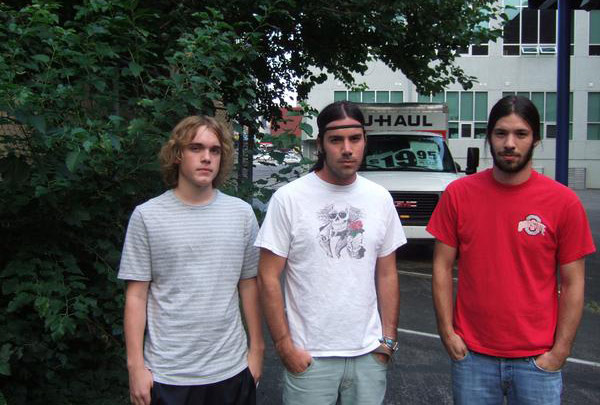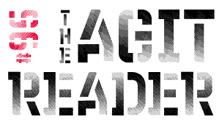
Mount Carmel
by Michael P. O’Shaughnessy
Those familiar with Siltbreeze Records’ output of late would probably assume that new Columbus acquisition, Mount Carmel, would follow in the fuzzed-out, scratchy punk vein as the rest of the catalog—and not just because of the established Midwestern penchant for freak rock or the Columbus proto-punk pedigree via luminaries like Jim Shepard and Mike Rep. Brothers Pat and Matt Reed, along with 17-year-old phenom Kevin “Young Buck” Skubak, decided that to capture the sound they feel, they needed to look past the recent history of music and all but ignore most of the records released by their local peers. Seeing as most new music sounds like it’s competing for some coveted spot on top of “can’t understand the lyrics” mountain or to be the president of “is that a guitar or a synth?” country, this band is almost an aberration. Mount Carmel makes no attempt to disguise their sound behind a wall of static, nor do they deviate from their obvious goal of channeling their British blues forefathers’ groundwork into a solid rock album and a total trip of a live show. There is no denying that their self-titled debut sounds like a hi-fi Disraeli Gears or a modern Stonedhenge. It sounds familiar, but there are no bands making music like this in 2010, or at least if there are, they aren't pulling it off nearly as convincingly.
How was South By Southwest?
Matt Reed: It was a good experience. We just played the one show. We got to go to Gonzales, Texas, which is about an hour away from Austin, and ate real barbeque. That was sweet.
Did you tour on the way down?
MR: No.
That’s a long drive for one show.
MR: Pretty much. (laughs)
So where does the name come from?
MR: When Pat and I used to just play edge-of-the-bed style, we used to joke around that it was a funny name, being that it was the hospital we were both born in. After we named the band that, people started telling us more about it—what it meant and the spiritual implications of it and stuff—and I ended up liking it even more. And it’s not just local Columbus. I mean, it is because of the hospital, but everyone’s first reaction is always, “What? That doesn’t make any sense. That is the dumbest thing ever.”
Yeah, but people from out of town aren’t going to know.
MR: Yeah, it’s kind of functioning locally as I would want it to, and out of town, as you know, nobody really knows what that is. It’s the other side of what the actual Mount Carmel is. It’s this mountain in Israel or something. I heard that it was the battleground where the pagans were defeated and this other weird fact that the trees are supposed to be really fertile there.
So I remember Pat playing with the twins, Joe and Tom, like 10 years ago or something, and thinking “Man, that kid can rip on guitar! I had no idea.”
MR: Yeah, the Immen brothers. Joe did our album cover.
And his stuff looks real good. So while we’re talking about this, tell me about the album cover. Was that your concept or did he just throw that together for you?
MR: It was Pat’s concept, but Joe did it in a way that we didn’t really expect him to. But we just went “fuck it,” you know? It’s good, whatever.
No, it looks great. So does Pat work that way with songwriting, too? Does he come up with a riff? I mean, he kind of plays like a lead guitarist on the bass.
MR: A lot of it. Most of the first record is stuff that I mainly wrote, just in the composition of the songs and words. But a lot of them, Pat probably came up with most of it. He definitely is there to help me, and now I couldn’t do it without him. He helped before, where he would say, “This is a good decision, this is a bad decision,” but now, he’s way more a part of it. For one of our newer songs, he wrote the riff, and he wrote the music too. Then I wrote the words, and we kind of formed it finally together. So now, it’s definitely become more of a joint thing between me and him.
It’s like that power-trio stuff, it seems like it opens it up for each one of you to sort of lead at different parts in the song. Does it work that way in practice?
MR: I think I know what you’re getting at here. In practice, we sit and work on composition and how we want to do things, but we’re always experimenting with songs, even older shit. Even if it’s like a year-old, we think that maybe we should rework it. It’s just a constant thing, nothing’s ever in stone. Certain things are, but nothing really is. There’s sometimes where we want to have that chaos, but not fully fall of the cliff—always teeter on the edge. It’s very hard to be able to do that in a relaxed state.
Yeah, you can tell in the live shows that you string it out and then just whip it back to the riff.
MR: Yeah, we string it out, and it’s not just about coming back into it; it’s like an actual part. It’s about actual fall-offs and come-ons that most people, like you said, don’t even notice during a solo or a just different part of the song. It’s just little things. I mean, Pat will be in the room, and he’ll go, “Right here” and just talk to Buck (Kevin Skubak), and they have this communication that I’m sort of on the outside of. He’ll go, “Right here, we’re doing this,” and then he’ll look over at me and say, “Oh, you don’t need to worry about any of this.” You know what I’m saying? Stuff like that.
Obviously you and Pat have known each other forever, so how did Buck come into the picture?
MR: We got him on Craigslist. I tell everybody if you need a drummer—or you need anything—just Craigslist it up, man. But we had been searching. We had been playing forever. The original line-up of the band was Pat on drums, Matt Yomans, our buddy, on bass, and me on guitar. I was sure Pat was going to be our drummer because he was getting really good, and then something happened where Matt Yomans wasn’t going to be in the band anymore. Pat picked up a bass because we wanted to work on songs, and it was easier to communicate song-wise with just the strings. When he picked up the bass, we finally had this thing where it was like, “Whoa, this is different. This is working here.” We decided to get a drummer and not to settle for anything that wasn’t what we wanted. We had a small stint with Barry (Dean, of Main Street Gospel), and we tried out 20 guys. We were real loose about it, and anyone who wanted to come in and play, could play. But we felt like we were wasting their time. Eventually we wrote an ad that was like, “You must be into this, and you must be this good.” You sound like a cock, but who cares?
Sometimes, if you know what you want, you can’t settle for less.
MR: That’s it. It was just like, “God, we’re too old. We don’t have time, okay?” So we put that out and then young Buck responded and said he was self-taught and he listened to these bands. He mentioned Canned Heat and some other stuff and he said he was just about to turn 17. Right when he rolled up, Pat was like, “Check out your boy. He’s just a baby.” When he started playing, I wasn’t sure he was going to be the drummer, but Pat was. He’s really become so much better than he was. He’s really good, but we’re still trying to find out how to play together.
It’s got to be at least kind of weird for him to walk into a “brothers” dynamic.
MR: Especially with two older guys, like two dudes who are their late twenties and he’s 16. But we wanted a younger kid, or someone that just had no ego and was really open and really willing to just listen and kind of do what we told him. But at the same time, it isn’t some kind of dictatorship.
You guys sound like Gibson bass guitars and giant Bonham drums, like Cream mixed with Zeppelin mixed with a whole bunch of reverby ’70s rock. I don’t want to call it ”boogie rock,” but do you know what I mean? Are you feeling that?
MR: I just say “blues,” because I love blues. It always comes back to that for me. Being a musician, the most natural way is to pick up an instrument that these dudes used and go the same route they did. You don’t just listen to it, you try to do it. You feel your own way through it. We’re not doing anything original—I know that—but we’re learning and hoping to come out on the other side with some semblance of having contributed something in our own way.
Back to the whole wasting time thing, do you really feel like you’re in a hurry?
MR: Yeah, man. It’s not like I’m rushing around, but it’s important enough to me that there’s always a sense of urgency. It means enough to me where it better be urgent, otherwise it’s out of sight, out of mind. It’s work, so yes, it’s urgent.
PRIMITIVE FUTURES
Spring Singles Round-Up
Hell, Yes! New Singles from Italy
All Hands Electric Singles Club Round One
Captured Tracks' International Division and the Birth of "Undie"
The Fresh & Onlys, August in My Mind EP
Introducing... Circle Pit
Nice Face, Immer Etwas
Guinea Worms, Sorcererers of Madness (4rd Year in a Row!)
Dead of Winter Singles Mixer
Introducing... Cloud Nothings
Nudge Squidfish, 20,000 Leagues Under Nashville
Night Control, Life Control
Hozac's Winter Storm
Introducing... Sweatheart
